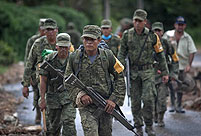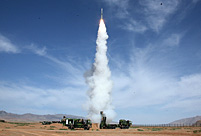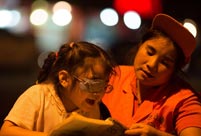Lu Jie suffered a lot during several "long journeys" to the office ahead of the Mid-Autumn Festival which fell on Thursday.
"Normally it takes me 40 minutes to drive to the office in the morning, but I have had to spend more than an hour recently due to holiday traffic jams," said Lu, who is among tens of millions of office workers in Beijing.
"It took me nearly 20 minutes to cover a few hundred meters in the morning rush hour, even though I left home half an hour earlier than usual," he added.
Travel peaked on Wednesday afternoon as the traffic index released by the Beijing Municipal Commission of Transport (BMCT) stood at 7.0 and the average vehicle speed was only 24.4 km per hour.
September is considered the most congested month in Beijing with the new school year and holidays such as the Mid-Autumn Festival and National Day contributing to congestion.
Festival traffic jams are particularly loathed by citizens, with some blaming the surge of private car ownership and the inefficiency of the public transportation system.
Figures from the BMCT show that as many as 5.35 million private cars had been registered in the city by the end of July this year.
Subway Line 4, one of the busiest, running 50 kilometers through western Beijing, suspended operations for nearly two hours on Monday due to a signal failure, leading to even worse congestion during the morning rush.
The congestion also raised public concern over air pollution from vehicle emissions.
Beijing Municipal Environmental Protection Bureau says that car emission contributes 22.2 percent of PM2.5 pollutants, the second biggest contributor to the problem after the 24.5 percent from regional transfer of pollutants.
In addition, vehicle emissions are closely related to their running speed. "When a car runs at 20 to 30 km per hour, its emission can be three times more than at 60 km per hour," said Li Kunsheng, the official in charge of car emissions with the bureau.
"Environmental protection can only be achieved through easing traffic congestion," Li added.
Beijing municipality has taken a series of measures to tackle congestion and pollution.
Earlier this month, Beijing produced a five-year clean air action plan, pledging to reduce PM 2.5 density by at least 25 percent by 2017, including tough measures on cutting emissions and industrial pollution.
The city will restrict the total number of vehicles to 6 million by 2017 by allowing fewer car registrations from next year. The city is also considering congestion fees and plans to spend big on public transportation to reduce private vehicle use.
Yang Xinmiao, deputy director of the Transport Institute at Tsinghua University, said that joint endeavors are needed in municipal planning, urban construction and transportation to deal with congestion.
"The government should continue to limit the number of vehicles, and employers should encourage their staff to take travel during non-peak times," Yang added.
 Storms leave 97 dead, 58 missing in Mexico
Storms leave 97 dead, 58 missing in Mexico New model of indigenous surface-to-air missiles testfired
New model of indigenous surface-to-air missiles testfired  118.28-carat diamond to be auctioned in HK
118.28-carat diamond to be auctioned in HK Maternal love under streetlight
Maternal love under streetlight Naked foreign student sits in the middle of a road in Haikou
Naked foreign student sits in the middle of a road in Haikou  Colorful Yunnan: Enjoy the natural beauty
Colorful Yunnan: Enjoy the natural beauty Harbin named Chinese city with most beautiful women
Harbin named Chinese city with most beautiful women New college students' military training in Guangzhou
New college students' military training in Guangzhou Rugby girls
Rugby girls PLA's 38th Group Army conduct training
PLA's 38th Group Army conduct training Residences of the royal house of Savoy
Residences of the royal house of Savoy The last days of Wan Aihua
The last days of Wan Aihua Highlights at 12th National Games of China
Highlights at 12th National Games of China Beijing Film Academy welcomes freshmen
Beijing Film Academy welcomes freshmen 2013 Taiwan Int'l Tourism Expo kicks off in Taipei
2013 Taiwan Int'l Tourism Expo kicks off in TaipeiDay|Week|Month